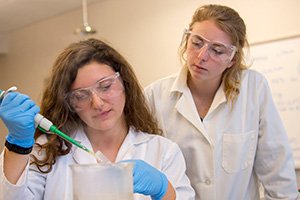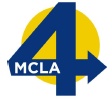General Health Sciences
Health Sciences Major
General Health Sciences Concentration
Health care provides a large and growing number of jobs, both in Massachusetts and nation-wide. The general Health Sciences degree will allow students to pursue careers and advanced study in a variety of health fields, including nursing, and this concentration would also be appropriate for students considering careers in nutrition.
Requirements
The general Health Science major includes courses from a variety of fields, including biology and chemistry. The required courses are as follows:
 BIOL 101 Seminar for Entering Majors (1 cr)
BIOL 101 Seminar for Entering Majors (1 cr)- BIOL 150 Introduction to Biology I: Cells (4 cr)
- BIOL 240 Genetics (4 cr)
- BIOL 250 Nutrition (3 cr)
- BIOL 302 Applied Statistics in Biology
- BIOL 320 Microbiology (4 cr)
- BIOL 342 Anatomy & Physiology I (4 cr)
- BIOL 343 Anatomy & Physiology II (4 cr)
- Elective BIOL course, 400-level or above (3-4 cr)
- CHEM 150 Introduction to Chemistry I (4 cr)
- CHEM 152 Introduction to Chemistry II (4 cr)
- MATH 232/232H Introduction to Statistics (3 cr)
- PSYC 100 Introduction to Psychology (3 cr)
- HLTH 105 Medical Terminology (1 cr)
- HLTH 210/210H Human Growth and Development (3 cr)
Students interested in pursuing Masters in Nutrition degrees should also consider taking CHEM 201 Organic Chemistry I, CHEM 202 Organic Chemistry II, and BIOL 360 Biochemistry.
MCLA in 4
 A sample 4-year plan showing a possible sequence of courses in this major.
A sample 4-year plan showing a possible sequence of courses in this major.
Articulation
Strong students who have met the requirements outlined in the articulation agreement gain preferred admission to the Master of Science in Nutrition program at the Sage Colleges in Albany, NY.
Research & Internships
Students in the general Health Sciences major observe health practitioners and/or do an internship or internships combining observation with an academic project to identify and gain experience in health fields of interest.
Application Tests
Students interested in applying to post-baccalaureate nursing programs or M.S. in Nutrition generally do not need to take standardized tests for admission. Admission requirements for other advanced degrees will vary.
Advising
A faculty advisor will meet with each student at least once per semester. Information about pre-requisites for nursing and nutrition programs, specific internships, research opportunities, upcoming courses, and other topics is provided to enrolled students on the Biology Department’s Canvas page.
Careers & Outcomes
Two biology graduates are currently enrolled in post-baccalaureate nursing programs with the goal of becoming nurse practitioners. One MCLA graduate completed the M.S. in Nutrition program at Sage Colleges using our articulation agreement.
Health care provides a large and growing number of jobs, both in Massachusetts and nation-wide. The general Health Sciences degree will allow students to pursue careers and advanced study in a variety of health fields, including nursing, and this concentration would also be appropriate for students considering careers in nutrition.
